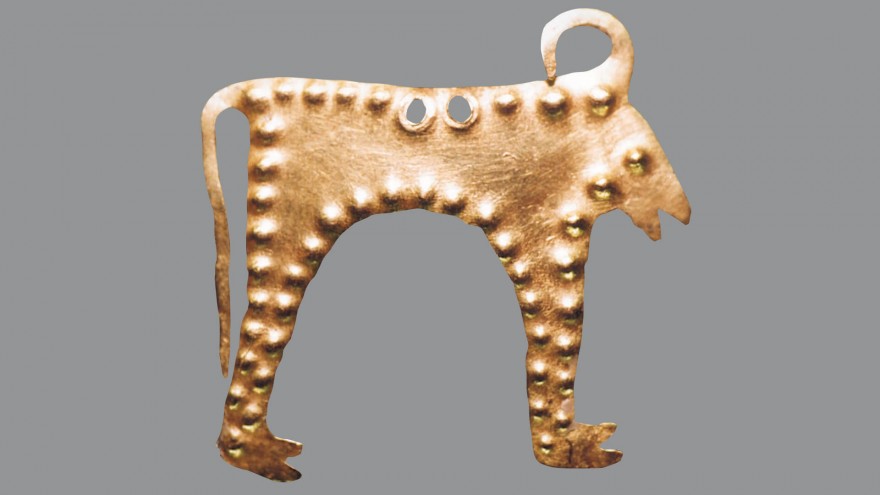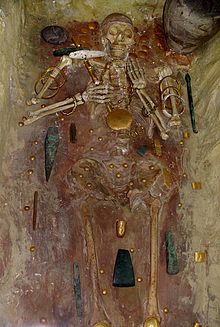At the height of communism, proof of a pre-historic class stratified society was found behind the Iron Curtain. An ancient cemetery was found in the Bulgarian city of Varna when digging trenches for the electrical foundation of a new cannery. Much like the discovery of Kennewick Man in 1996, the discovery of what would come to be known as the Varna Chalcolithic Necropolis would completely reshape our understanding of prehistoric society. Unlike the discovery of Kennewick Man, archaeologists found something shinier, more telling, and worth far more money than bones--gold. 138 pounds (63 kg) of gold to be exact.
In October of 1972 Raycho Marinov found a dirty bracelet in the bucket of his excavator. He was digging in West Varna, where it wasn't too uncommon to find historical artifacts. Farmers frequently dug up copper coins in their fields, so Raycho didn't think too much of it. He gathered up the bracelet, as well as a few other pieces of jewelry he found lying in the area, and put them in a shoebox with his boots. He forgot about the box for a couple of weeks before giving the gold to his old teacher, and curator of the local history museum, Dimitar Zlatarski. Zlatarski, recognizing the value of the pieces, called in experts from the Varna Archaeological Museum.
Upon examination, it turned out that what Marinov had found was far more valuable than the copper coins found in nearby fields. The jewelry dated back to the Copper Age, and Marinov's find was the biggest find of Copper Age artifacts at the time.
A full fledged excavation began almost immediately. Though it had been months since Marinov found the original pieces of jewelry, the dig site remained mostly intact. Archaeologists descended on the site in droves, and a near constant dig was in progress from 1972 to 1991.
What archaeologists found in Varna was a vast graveyard belonging to the long vanished Varna Culture, a Copper Age society living in Eastern Europe long before the invasion of Indo-Europeans. Hundreds of graves littered the landscape, buried under years of debris.
Much like many other societies, the people of the Varna Culture buried their dead with funerey goods--presumably to help the deceased in the afterlife. These grave goods gave insight into the dress and customs of the Varna Culture. The quality of (or lack thereof) of the goods proved that the Varna Culture had a system of social classes, making them one of the first cultures in the world to do so.
The evidence of some sort of class structure became evident when archaeologists opened what is now called Grave 43. It contained the bones of a man positively dripping in gold. The man wore bracelets, necklaces, rings, and carried a scepter. Gold disks, presumably once sewn to his long disintegrated clothing, surrounded him, as well as a gold sheathe for his penis. Though the archaeologists had found that some graves were nicer than others, they hadn't found a grave with such riches.
The fact that the skeleton was a male was particularly interesting to the archaeologists, because it challenged the contemporary theory that prehistoric Europe was a matriarchal society, and didn't become a patriarchal society until the invasion of the Indo-Europeans. Grave 43 was the first instance of a man who had been buried with a large amount of precious grave goods. Though some archaeologists suggest that this man could have lived during a period of transition, Grave 43 still leaves more questions than it answers.
Actual humans weren't the only ones to be buried with tons of gold. Several graves full of gold and clay heads were also excavated. It is speculated that these are 'ceremonial graves', and that the gold jewelry is an offering for the deities represented by the clay heads.
Unfortunately, about 30% of the dig site remains unexplored. Excavation stopped in 1991 due to a lack of funds, and archaeologists have been unable to raise the money to begin again. Much of the discovered gold resides at the Varna Archaeology Museum, and the gold frequently tours museums across Europe.
The find at Varna represents a major piece of the puzzle that is pre-historic European society. Though these discoveries raise many more questions than they answer, the provide valuable insight into the wealth of the society, the size of the Varna Culture, and into their religious beliefs and practices.
Sources
Varna Man and the Wealthiest Grave of the 5th Millennium BC
The Oldest Gold Treasure in the World
Mystery of the Varna Gold
 |
| Gold animal ornament found at Varna. This would most likely be sewn onto clothing. |
Upon examination, it turned out that what Marinov had found was far more valuable than the copper coins found in nearby fields. The jewelry dated back to the Copper Age, and Marinov's find was the biggest find of Copper Age artifacts at the time.
 |
| This clay head, adorned with gold, was found in one of the 'ceremonial graves'. These clay figurines were most likely buried for religious purposes. |
Much like many other societies, the people of the Varna Culture buried their dead with funerey goods--presumably to help the deceased in the afterlife. These grave goods gave insight into the dress and customs of the Varna Culture. The quality of (or lack thereof) of the goods proved that the Varna Culture had a system of social classes, making them one of the first cultures in the world to do so.
The evidence of some sort of class structure became evident when archaeologists opened what is now called Grave 43. It contained the bones of a man positively dripping in gold. The man wore bracelets, necklaces, rings, and carried a scepter. Gold disks, presumably once sewn to his long disintegrated clothing, surrounded him, as well as a gold sheathe for his penis. Though the archaeologists had found that some graves were nicer than others, they hadn't found a grave with such riches.
The fact that the skeleton was a male was particularly interesting to the archaeologists, because it challenged the contemporary theory that prehistoric Europe was a matriarchal society, and didn't become a patriarchal society until the invasion of the Indo-Europeans. Grave 43 was the first instance of a man who had been buried with a large amount of precious grave goods. Though some archaeologists suggest that this man could have lived during a period of transition, Grave 43 still leaves more questions than it answers.
 |
| The contents of Grave 43 |
Actual humans weren't the only ones to be buried with tons of gold. Several graves full of gold and clay heads were also excavated. It is speculated that these are 'ceremonial graves', and that the gold jewelry is an offering for the deities represented by the clay heads.
Unfortunately, about 30% of the dig site remains unexplored. Excavation stopped in 1991 due to a lack of funds, and archaeologists have been unable to raise the money to begin again. Much of the discovered gold resides at the Varna Archaeology Museum, and the gold frequently tours museums across Europe.
The find at Varna represents a major piece of the puzzle that is pre-historic European society. Though these discoveries raise many more questions than they answer, the provide valuable insight into the wealth of the society, the size of the Varna Culture, and into their religious beliefs and practices.
Sources
Varna Man and the Wealthiest Grave of the 5th Millennium BC
The Oldest Gold Treasure in the World
Mystery of the Varna Gold


